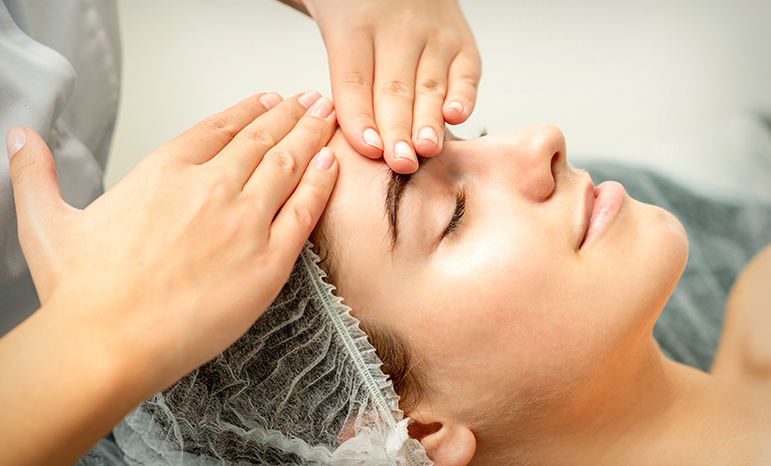
A facial treatment is a great way to get a youthful glow. Facial treatment can help to reduce wrinkles, brighten the complexion, and exfoliate the skin. Depending on the type of facial you choose, you can also get a massage and facial mask to nourish and hydrate the skin. The type of facial you should choose depends on your skin type, skin concerns, and desired results. Many spas and salons offer a variety of facial treatments, so it is essential to choose the one that best fits your needs. When booking an appointment, ask your esthetician about the products and techniques used to ensure you get the best results.
Table of Contents
Types of Facial Treatments
- Facial Cleansing: The first step to any facial treatment is deep cleansing. It involves the use of a cleanser to remove dirt, oil, and makeup, followed by a toner to remove any remaining residue.
- Exfoliation: This involves the use of a scrub to remove dead skin cells and reveal the new, healthy skin beneath. It can also help reduce the appearance of fine lines and wrinkles.
- Masks: Facial masks are a great way to nourish and moisturize the skin. They can also help treat skin problems such as acne and dryness.
- Peels: Chemical peels are a type of facial treatment that uses a chemical solution to exfoliate the skin. It can help reduce the appearance of wrinkles, acne scars, and other skin imperfections.
- Microdermabrasion: This is a type of facial treatment that uses an exfoliating device to remove the outer layer of skin. It can help reduce the appearance of fine lines and wrinkles, as well as improve the overall texture and tone of the skin.
- Facial Massages: Facial massages can help relax the muscles in the face and improve circulation. It can also help reduce puffiness and improve the skin’s overall appearance.
Benefits of Facial Treatments
- Improved Skin Texture and Tone: Facial treatments can help to improve skin texture and tone by providing hydration, removing dead skin cells, and stimulating collagen production. This helps to reduce the appearance of fine lines, wrinkles, and other signs of aging.
- Reduced Acne and Acne Scars: Facial treatments can help to reduce acne and acne scars by unclogging pores, removing excess oil, and exfoliating the skin.
- Improved Circulation: Facial treatments can improve circulation by increasing the delivery of oxygen and nutrients to the skin. This helps to promote healthy skin cells and a healthy complexion.
- Reduced Stress: Facial treatments can be very relaxing and can help to reduce stress levels. This can help to improve overall mental and physical health.
- Increased Confidence: Facial treatments can leave your skin looking and feeling refreshed and rejuvenated. This can boost your confidence and self-esteem.
Preparation for Facial Treatments
- Gather all necessary supplies, such as facial cleanser, toner, masks, exfoliants, moisturizers, and other products according to the facial treatment.
- Set up a clean, comfortable work area with a massage table, fresh linens, and a stool.
- Prepare the treatment products and warm towels according to the instructions.
- Cleanse the client’s face with a gentle cleanser and warm water.
- Exfoliate the skin with a gentle scrub to remove dead skin cells.
- Apply a mask or other treatment product according to the instructions.
- Massage the face and neck to relax the muscles and promote circulation.
- Apply a moisturizer to hydrate and protect the skin.
- Remove all products and clean the skin with a toner and cold water.
- Apply sunscreen and provide the client with aftercare instructions.
Aftercare for Facial Treatments
- Avoid sun exposure for at least 24 hours after a facial.
- Apply a moisturizer with SPF every morning and night.
- Consider using a cold compress to reduce any redness or swelling.
- Use gentle cleansers and avoid harsh exfoliants for a few days.
- Drink lots of water to help keep your skin hydrated.
- Avoid touching or rubbing your face.
- Avoid wearing heavy makeup and avoid wearing tight clothing on your face.
- Avoid strenuous exercise or activities that may cause excessive sweating.
Conclusion
Facial treatments are an important part of a good skincare routine. They can help to reduce the signs of aging, clear up acne and other skin conditions, and even out skin tone. Facial treatments should be done on a regular basis to keep skin looking fresh and healthy. Regular treatments can also help to prevent future skin problems from developing. Facial treatments are best done by a professional, who can tailor a treatment plan to suit the individual’s skin type and needs.







